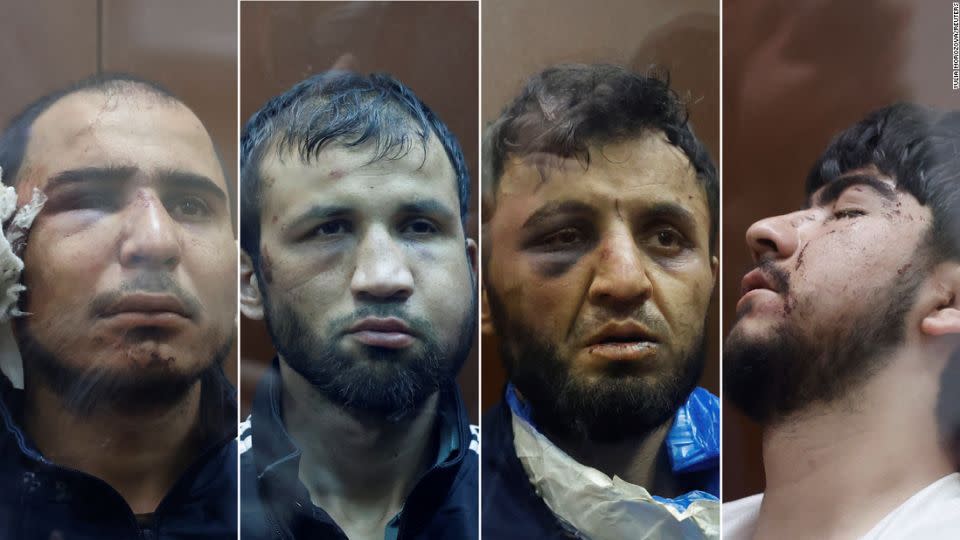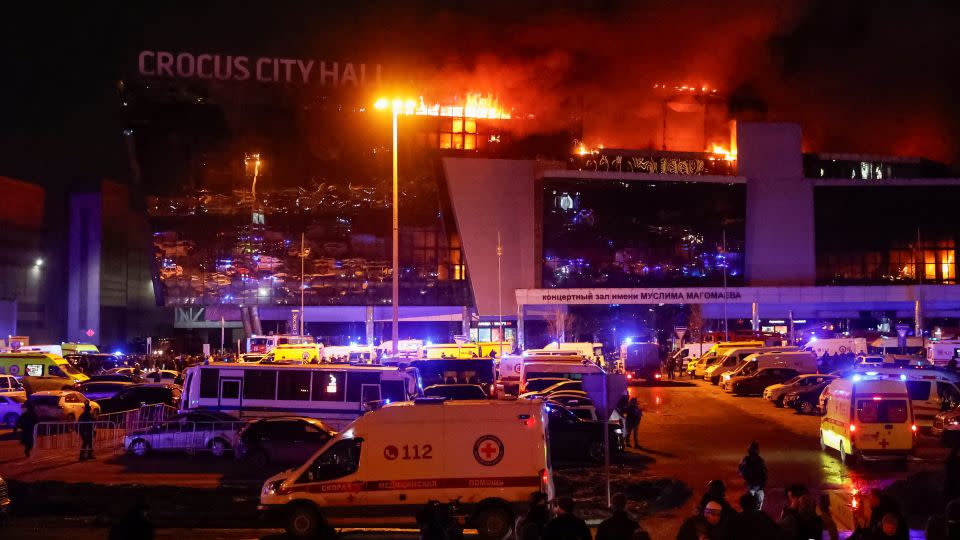Central Asian migrants face xenophobic backlash in Russia after Moscow terror attack
The four men accused of a deadly terror attack on Moscow’s Crocus City concert hall last week were quickly identified by Russian authorities as being from Tajikistan, a former Soviet republic in Central Asia.
In the hours after the attack, videos began surfacing on Russian social media channels of the police detaining and brutally abusing the alleged attackers, with one appearing to show a suspect having part of his ear cut off and subsequently forced into his mouth. The men had been in Russia as migrant workers on either temporary or expired visas, authorities said.
Russians are understandably shocked and saddened by the attack. But in the days since, that emotion – combined with the disturbing videos – appears to have unleashed a wave of xenophobia from some towards Central Asian migrant workers in general.
On the social media platform X, CNN saw posts that showed people looking for taxis, asking for their rides to be cancelled if the driver was Tajik. One purported photo of a conversation said, “If you are Tajik, please cancel my ride.”
A torrent of abuse has also reportedly been directed towards a barbershop in the city of Ivanovo, where one of the alleged attackers worked. The owner of the shop told Russian journalists that her phone had been ringing “non stop” with death threats, and is quoted by a Russian daily newspaper, Moskovsky Komsomolets, as saying, “I’m pregnant and I don’t know what to do. I’m afraid to go outside.”
As a consequence, Russian President Vladimir Putin now finds himself in an increasingly delicate position with regard to migrant workers, who occupy vital roles in the Russian workforce — particularly while the country is at war.

Perhaps wary of a split in Russian society, Putin on Wednesday called for Russia to remain united.
“We must never forget that we are a multinational, multi-religious country. We must always treat our brothers, representatives of other faiths with respect, as we always do — Muslims, Jews, everyone,” he said.
‘It’s going to be a very, very tough period of time’
Migrants from the former Soviet Union’s Central Asian states — Tajikistan, Uzbekistan, Kyrgyzstan, Turkmenistan and Kazakhstan — have traditionally been a valuable source of cheap labour in Russia.
Generally, they’ve occupied the jobs that many Russians feel are beneath them, such as taxi drivers, truck drivers or supermarket workers. The money they send back in the form of remittances has been an important driver of growth in their home countries.
But many now feel under threat. A well-respected lawyer and migrant activist, Valentina Chupik, told CNN that calls from migrants in Russia asking for legal assistance had skyrocketed from 150 per day before the attack to over 6,000 in total as of Saturday, and that “those numbers are changing with every passing minute.”
Chupik, a native of Uzbekistan who now lives and works in Illinois, runs an NGO focusing on migrant welfare called Tong Jahoni. Her organization offers legal assistance to migrants looking for help in Russia, only on a pro bono basis. She told CNN that the police are clearly cracking down on migrants, but believes the attack in Moscow is being used as cover, exposing a darker side to society.
“The police are trying to pretend that they are actively fighting ethnic crime and preventing terrorist attacks. Actually, they’re robbing migrants. I have dozens of complaints about migrants being stopped by police, and (the police) have stolen whatever they liked,” she said.
Human Rights Watch, in their annual world report said that “Russian police continued to racially profile non-Slav migrants and ethnic minorities and subject them to unsubstantiated ID checks and detentions, often prolonged, in inhumane conditions. Some have been physically assaulted”.
Temur Umerov, an expert on Central Asia at the Carnegie Russia Eurasia Center in Berlin, told CNN that Moscow’s war in Ukraine has been accompanied by a rapid growth of xenophobia in Russian society, particularly among people who see themselves as Nazis, or neo-Nazis.
“It gave them permission to speak their mind freely and not be shut down or criticized by other parts of society because they’re fighting for Russia … whether it’s online, whether it’s on the real front (in Ukraine),” he said.

A CNN analysis of several pro-war Russian Telegram channels and their messages in the wake of last Friday’s attacks found a clear emergence of xenophobia.
In one channel called the GreyZone, which has half a million followers, a user posted a comment saying: “We need to boycott the service they provide: don’t eat in their cafes, don’t get your hair cut with them, don’t ride in their taxi, don’t BUY ANYTHING FROM THEM AT ALL. We need to spread the word.”
A user in another channel, with 200,000 followers, suggested there was no space for anyone to feel sorry for migrants in Russia. “It is important not to forget that they are not victims at all, but the real executioners and murderers of good Russian people,” the user wrote. “There is no reason to feel sorry for them, they only deserve contempt and being immediately kicked back to their home, into the cesspool called Tajikistan.”
Against this backdrop of simmering xenophobia, the Kyrgyz Foreign Ministry issued a travel warning for its citizens Monday, saying they should refrain from traveling to Russian territory “until the removal of additional security measures and the regime of enhanced control of passage through the state border.”
“As a migrant, it’s going to be a very, very tough period of time in Russia,” Umerov said, speaking to CNN from the Uzbek capital, Tashkent.
According to Umerov, there are some 7 million migrants in Russia, of whom around 80% are from Central Asia.
“Migrants work for much lower salaries than ordinary Russians, and are more willing to work in much more difficult and harsh conditions,” he said.
The salaries offered by Russia, and subsequently the remittances that migrants send back to their families, serve the dual function of filling key jobs in the Russian labour market and boosting GDPs for migrants’ home nations.
The European Bank for Reconstruction and Development forecast in September 2023 that economic growth in Central Asia would hit 5.9% in 2024, with remittances playing a role. Tajikistan was expected to see the biggest GDP growth in the region, reaching 7.5% in 2023 and 2024, the report said, thanks in part to “the inflow of remittances from Russia.”
Umerov noted that since Putin launched his full-scale invasion of Ukraine two years ago, the economy’s reliance on migrant workers has increased.
“Migrants are crucial for several sectors of running the Russian economy. In several sectors, it’s impossible to have the level of stability it has without the labour force of migrants,” Umerov said. “Russia crucially needs it – without, it would be just impossible.”
Research by the Institute of Economics at the Russian Academy of Sciences, reported by the Izvestia newspaper in December and cited by Reuters, found Russia was likely short of some 4.8 million workers in 2023, with some of the key sectors affected being construction, drivers and retail.
The invasion of Ukraine has had a significant impact on the available Russian workforce. Thousands of Russian men have been mobilized to fight in Ukraine, where many thousands have already been killed, depending on estimates. Hundreds of thousands more are believed to have fled the country in September 2022, after Putin called for a partial mobilization.
Since the attack on Crocus City Hall, Putin and his advisers, including internal and foreign intelligence chiefs, have sought to level the accusation that Ukraine was somehow involved in the attacks, without presenting any concrete evidence.
Ukraine and Western nations have been quick to shut that notion down.
Putin has not, however, pointed the finger of blame toward Emomali Rahmon, president of Tajikistan, despite all evidence suggesting that the attackers were radicalized by the jihadist group ISIS-K, which is known to target recruits in Tajikistan.
On Sunday, the Kremlin said Putin had spoken with Rahmon and that special services in Russia and Tajikistan “are working closely in the field of countering terrorism, and this work will be intensified.”
Umerov notes that Putin is toeing a fine line. In a world where the Russian president has so few allies, having alienated the West with his war on Ukraine, he cannot be seen to be making enemies out of friends.
“Putin just cannot admit that there are problems in Russia-Tajikistan relations, especially right now,” Umerov said. “Tajikistan is one of the closest allies that Putin has, and when Russia is so isolated, it is not in a position to pick which countries it can be in relationships with.”
For more CNN news and newsletters create an account at CNN.com


